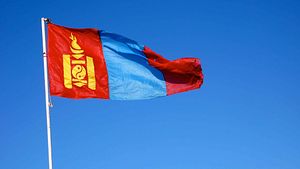The Russian invasion of Ukraine has caused thousands of casualties, displaced 1 million refugees, and sent foreign governments scrambling to get their citizens to safety using diplomatic and emergency evacuation measures. Mongolia, too, has been carefully coordinating with its Eastern European partners, including Ukraine, Poland, Hungary, and Czechia, to evacuate Mongolian citizens.
In late February, before the Russian troop movements into Ukraine, the Embassy of Mongolia in Warsaw began recommending that its citizens leave Ukraine as tensions escalated and diplomatic efforts were derailed. On February 28, the Foreign Ministry of Mongolia stated that the Mongolian embassies in Poland, Hungary, and Czechia were responsible for contacting Mongolian citizens residing in Ukraine and mobilizing an evacuation plan and executing those plans using government funds.
So far, 23 Mongolian citizens have been evacuated from Kharkiv, using the Kharkiv-Lviv train to reach the Poland-Ukraine border – a journey of approximately 1,100 km. Another 11 citizens, mostly students from Odessa, Kyiv, and Kirovohrad, travelled by car to meet Mongolian consulate workers at Poland-Ukraine border crossing points. According to a source from the foreign ministry, all those students were on scholarships, and may see their educations permanently disrupted by the war.
As of March 2, thanks to the Mongolian foreign ministry and collaboration of Eastern European partners, Mongolia had successfully evacuated 58 of its citizens from Ukraine.
While some Mongolia observers are conflicted about how Mongolia should respond to the current Russia-Ukraine war, others familiar with Mongolian foreign policy understand and predicted Mongolia’s response.
On March 2, the United Nations General Assembly convened an emergency session to condemn Russia’s invasion of Ukraine. Mongolia abstained along with 34 other nations, including China and India. No doubt, Mongolia’s abstention raised some eyebrows in diplomatic circles. However, from both a security and a foreign policy standpoint, given Mongolia’s geopolitical challenge, its relations with its neighbors – Russia and China – cannot be hindered by external instabilities. At the same time, Mongolia’s abstention does not mean it will miraculously avoid the economic damages that are already following the war and widespread sanctions on Russia.
Moreover, in response to the current events, Mongolian people have begun to speak out in support of peaceful dialogues between Russia and Ukraine.
On March 3, eight peace advocates gathered in Sukhbaatar Square in Ulaanbaatar. One of the advocates, B. Bilguun, wearing a white T-shirt that said #nowar, told a journalist “In our generation—in 2022—we should not be worried about tanks destroying cities and bullets going through windows. The current Russia-Ukrainian crisis is really about global oligarchs fighting for resources, where superpowers bully smaller players. I am here because I would like to show the world that Mongolia stands with peace.”
Peace activists gathered again in Sukhbaatar Square on March 5 to call for an end to the war. They were joined this time by former President Elbegdorj Tsakhia.
Just one month before Russian troops entered Ukraine, on January 21, Mongolia and Ukraine celebrated 30 years of diplomatic relations in the Ukraine parliament in Kyiv. The event celebrated the countries’ history, shared values, and political, economic, and business cooperation. The ceremony was attended by the Mongolian ambassador to Ukraine, Dorj Barkhas; the chairman of the Mongolia-Ukraine Friendship Committee, I. Krishoviv; and Ukrainian Deputy Foreign Minister Dmytro Senik, as well as geologists, businesspeople, and research representatives.
Earlier, in October 2021, 40 business entities from Mongolia and Ukraine organized an online summit to improve the two countries’ business environment. Given the war’s current escalation, these opportunities will inevitably be delayed.
Mongolians, for generations, have traveled to work and study in both Russia and Ukraine. Mongolian leaders have traveled to Kyiv and Crimea, inspired by its maritime capabilities, only to return to a landlocked economy. But Mongolian leaders also understand that in order for Mongolia to develop, its foreign policy must be flexible yet shrewd, capable of prioritizing national interest. Governments, parties, and superpower ambitions change over time, but the one constant in a bilateral relationship is the people-to-people ties. These values should be protected at all times.
The elephant in the room is how Mongolia will handle the newly emerging geopolitical changes and economic pressures, all while maintaining stable bilateral and multilateral relations with both Russia and China, and with the rest of the world.

































